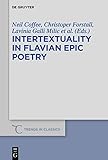Intertextuality in Flavian Epic Poetry : Contemporary Approaches / ed. by Neil Coffee, Chris Forstall, Lavinia Galli Milic, Damien Nelis.
Material type: TextSeries: Trends in Classics - Supplementary Volumes ; 64Publisher: Berlin ; Boston : De Gruyter, [2019]Copyright date: ©2020Description: 1 online resource (IX, 476 p.)Content type:
TextSeries: Trends in Classics - Supplementary Volumes ; 64Publisher: Berlin ; Boston : De Gruyter, [2019]Copyright date: ©2020Description: 1 online resource (IX, 476 p.)Content type: - 9783110597684
- 9783110599756
- 9783110602203
- 873.0109 23
- PA6054 .I58 2020
- PA6054 .I58 2020
- online - DeGruyter
- Issued also in print.
| Item type | Current library | Call number | URL | Status | Notes | Barcode | |
|---|---|---|---|---|---|---|---|
 eBook
eBook
|
Biblioteca "Angelicum" Pont. Univ. S.Tommaso d'Aquino Nuvola online | online - DeGruyter (Browse shelf(Opens below)) | Online access | Not for loan (Accesso limitato) | Accesso per gli utenti autorizzati / Access for authorized users | (dgr)9783110602203 |
Frontmatter -- Contents -- Acknowledgments -- Introduction -- Meanwhile Back at the Ranch: Narrative Transition and Structural Intertextuality in Statius Thebaid 1 -- Valerius Flaccus’ Argonautica 3.598–725: Epic, History, and Intertextuality -- Allusive Technique in the Argonautica of Valerius Flaccus -- Searching for Ovid at Cannae: A Contribution to the Reception of Ovid in Silius Italicus’ Punica -- The Flavian Epics and the Neoterics -- Allusive (Im-)Pertinence in Statius’ Epic -- Collateral Damage? Todeskette in Flavian Epic -- Replaying Dido: Elegy and the Poetics of Inversion in Valerius Flaccus’ Argonautica -- Foreshadowing Medea: Prolepsis and Intertextuality in Valerius Flaccus -- Ulysses as an Inter (and Meta-)textual Hero in the Achilleid of Statius -- Constructing (Super-)characters: The Case Study of Silius’ Hannibal -- The Redemption of the Monster, or: The ‘Evil Hero’ in Ancient Epic -- Flavian Gods in Intertextual Perspective. How Rulers Used Religious Practice as a Means of Communicating -- Palatine Apollo, Augustan Architectural Ecphrasis, and Flavian Epic Intertextuality -- Statius’ Post-Vesuvian Landscapes and Virgil’s Parthenope -- Quantitative and Qualitative Perspectives on the Use of Poetic Tradition in Silius Italicus’ Punica -- Lemmatizing Latin and Quantifying the Achilleid -- How Rare are the Words that Make Up Intertexts? A Study in Latin and Greek Epic Poetry -- Pre- and Post-digital Poetics of ‘Transliteralism’: Some Greco-Roman Epic Incipits -- List of Contributors -- Index Locorum
restricted access online access with authorization star
http://purl.org/coar/access_right/c_16ec
This collection of essays reaffirms the central importance of adopting an intertextual approach to the study of Flavian epic poetry and shows, despite all that has been achieved, just how much still remains to be done on the topic. Most of the contributions are written by scholars who have already made major contributions to the field, and taken together they offer a set of state of the art contributions on individual topics, a general survey of trends in recent scholarship, and a vision of at least some of the paths work is likely to follow in the years ahead. In addition, there is a particular focus on recent developments in digital search techniques and the influence they are likely to have on all future work in the study of the fundamentally intertextual nature of Latin poetry and on the writing of literary history more generally.
Issued also in print.
Mode of access: Internet via World Wide Web.
In English.
Description based on online resource; title from PDF title page (publisher's Web site, viewed 28. Feb 2023)


